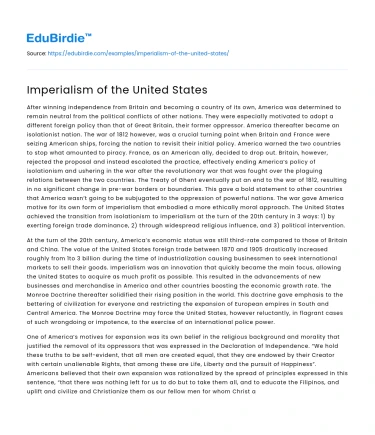After winning independence from Britain and becoming a country of its own, America was determined to remain neutral from the political conflicts of other nations. They were especially motivated to adopt a different foreign policy than that of Great Britain, their former oppressor. America thereafter became an isolationist nation. The war of 1812 however, was a crucial turning point when Britain and France were seizing American ships, forcing the nation to revisit their initial policy. America warned the two countries to stop what amounted to piracy. France, as an American ally, decided to drop out. Britain, however, rejected the proposal and instead escalated the practice, effectively ending America’s policy of isolationism and ushering in the war after the revolutionary war that was fought over the plaguing relations between the two countries. The Treaty of Ghent eventually put an end to the war of 1812, resulting in no significant change in pre-war borders or boundaries. This gave a bold statement to other countries that America wasn’t going to be subjugated to the oppression of powerful nations. The war gave America motive for its own form of imperialism that embodied a more ethically moral approach. The United States achieved the transition from isolationism to imperialism at the turn of the 20th century in 3 ways: 1) by exerting foreign trade dominance, 2) through widespread religious influence, and 3) political intervention.
At the turn of the 20th century, America’s economic status was still third-rate compared to those of Britain and China. The value of the United States foreign trade between 1870 and 1905 drastically increased roughly from 1to 3 billion during the time of industrialization causing businessmen to seek international markets to sell their goods. Imperialism was an innovation that quickly became the main focus, allowing the United States to acquire as much profit as possible. This resulted in the advancements of new businesses and merchandise in America and other countries boosting the economic growth rate. The Monroe Doctrine thereafter solidified their rising position in the world. This doctrine gave emphasis to the bettering of civilization for everyone and restricting the expansion of European empires in South and Central America. The Monroe Doctrine may force the United States, however reluctantly, in flagrant cases of such wrongdoing or impotence, to the exercise of an international police power.
Save your time!
We can take care of your essay
- Proper editing and formatting
- Free revision, title page, and bibliography
- Flexible prices and money-back guarantee
One of America’s motives for expansion was its own belief in the religious background and morality that justified the removal of its oppressors that was expressed in the Declaration of Independence. “We hold these truths to be self-evident, that all men are created equal, that they are endowed by their Creator with certain unalienable Rights, that among these are Life, Liberty and the pursuit of Happiness”. Americans believed that their own expansion was rationalized by the spread of principles expressed in this sentence, “that there was nothing left for us to do but to take them all, and to educate the Filipinos, and uplift and civilize and Christianize them as our fellow men for whom Christ also died”. These words were written by president William McKinley about the Philippian people. The document was a rationalization on why America's actions were morally acceptable based on the subjective conclusion that relatively new countries wouldn’t be able to self-govern without American guidance.
The drastic change from America’s first policy of isolationism was also continuously reformed and expressed by its intervention in the political affairs of other nations. The United States grounded their reasoning for imperialism in the self-convinced notion of superiority over inferior races in need of freedom from their oppressors. The Panama Canal project is an example of what began first as political mediation from America, helping the Panamanians declare independence without any interference from Colombia. America was then granted control of the Panama Canal Zone. Executed through the signing of the Hay-Bunau-Varilla Treaty on November 18, 1903, an agreement between the United States and Panama, it granted canal rights across the Isthmus of Panama in transaction for protection of the newly established republic as well as financial reimbursements. Upon completion of the Panama Canal on August 15, 1914, the canal became an extremely dynamic geopolitical strategic possession, having a massive economic impact and making America at the time, the most powerful nation on earth.
Following the War of 1812, the roots of American imperialism became embedded into the ideology of America’s foundation. Its beginnings differed in motive and method from those of traditional European style imperialism, however, the short-term gains may have been outweighed by the long-term effects on these societies. Many of those who were occupied because of the self-belief of the goodwill of the United States were able to see the beneficial results of prosperity. Compared to modern times, such methods are considered inhumane both to America and those countries. Because of this, many former territories have chosen independence from America to regain cultural and religious identity. Imperialism, although reflects injustice in certain forms of morality, it juxtaposes the righteous motive against the cruelty of embodying that righteous motive in action in order to accomplish the ordained destiny given by God to those chosen.






 Stuck on your essay?
Stuck on your essay?

